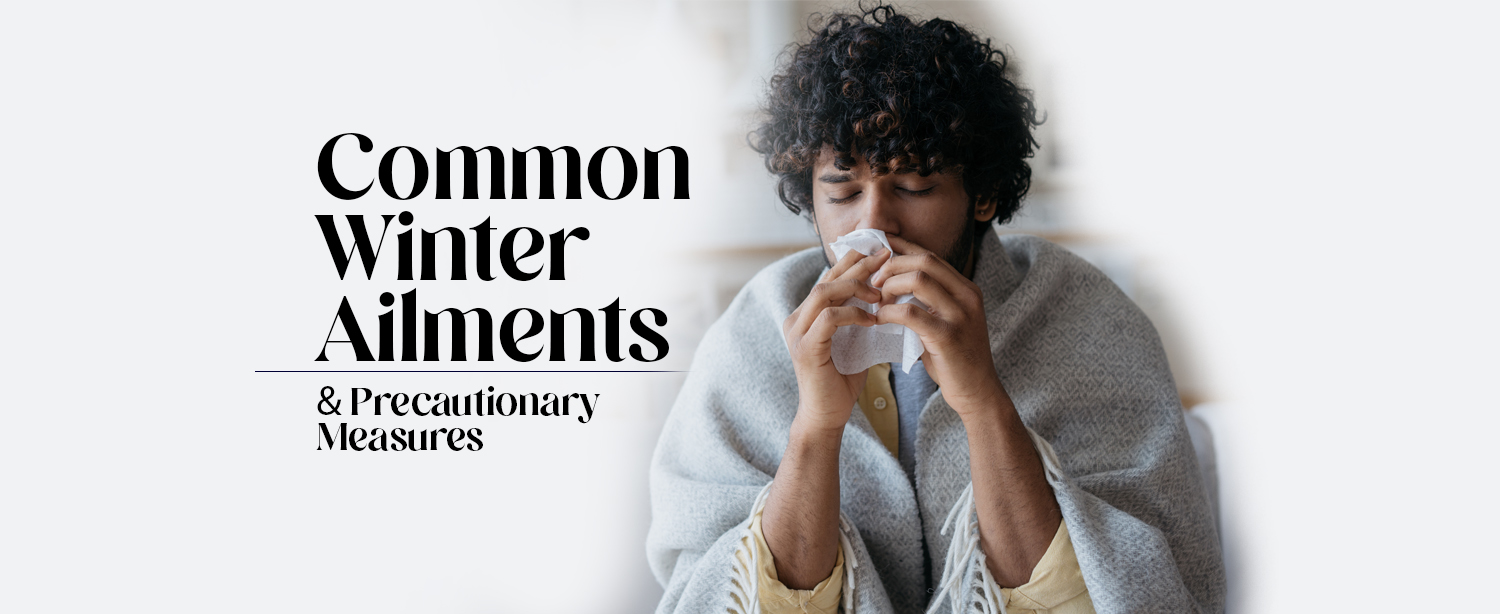Indulging in the winter breezes while savoring a hot cup of coffee? While the festive vibes bring joy and an opportunity to showcase your winter jacket, they can also bring health challenges for some. Seasonal transitions often coincide with an increase in illnesses, as the fluctuating temperatures provide an environment for viruses to thrive and spread. This time of the year may leave you feeling sluggish, lethargic, and more susceptible to illnesses due to a dip in immunity. If you’re experiencing discomfort or showing signs of wheezing or high fever, don’t hesitate to promptly seek medical assistance.
Common Winter Ailments
Let’s take a look at some of the most common winter conditions:
- Flu
Winters and flu often go hand in hand. The season witnesses a surge in flu viruses circulating in the air, and your immune systems may need an extra boost. Combat the flu by maintaining a nutrient-rich diet, staying hydrated, and incorporating regular exercise into your routine. - Dry Skin
The biting cold can leave your skin parched and vulnerable. Combat dry skin by indulging in moisturizers, opting for mild soaps, and using hand lotions or petroleum jelly. These simple steps can shield your skin from cracks, pain, and infections associated with winter dryness. - Joint Pain
Arthritis patients, in particular, may experience intensified joint pain during the winter. The plummeting temperature can trigger discomfort and reduced mobility. Keep joints warm with layered clothing and engage in regular exercises tailored for winter, ensuring your body stays warm and flexible. - Cold Sores
Dry and cold air creates an environment conducive to cold sores. To ward off these unwelcome guests, prioritize proper nutrition, regular exercise, and ample rest. Home remedies can also play a role in preventing and managing cold sores. - Asthma
Winter brings not just the chill but also airborne allergens, a trigger for asthma attacks. Protect yourself by wearing air-purifying masks outdoors and staying vigilant about indoor air quality. - Pneumonia
Pneumonia is a life-threatening disease in which viral and bacterial infections (commonly the Streptococcus or pneumococcus bacteria) spread out in the alveoli or tiny sacs of the lungs clogging them with fluids. Hence, individuals affected by pneumonia experience shortness of breath. The microbes responsible for pneumonia transmission can be disseminated through coughing, sneezing, or contact with contaminated surfaces, subsequently leading to infection when touching the mouth or nose. - Seasonal Affective Disorder (SAD)
The winter blues are real, manifesting as Seasonal Affective Disorder (SAD) for some. Combat this by fostering connections, joining support groups, and ensuring your mental well-being remains a priority.
Winter Health Precautions
Follow these helpful tips to protect your body in winter season:
- Eat a nutrient-rich diet and fortify your immune system with a diet rich in vitamins and minerals. Include seasonal fruits and vegetables for an extra boost.
- Keep those joints moving and your body warm with winter-specific exercises. Indoor activities like yoga can also be beneficial.
- Engage in winter-specific exercises to keep your body warm and flexible.
- Dressing in layers not only keeps you warm but allows you to adjust to fluctuating temperatures.
- Combat the winter blues by maintaining social connections, seeking sunlight exposure, and prioritizing mental health.
- Wash your hands frequently to reduce the spread of infections.
- Drink more warm fluids during the season to keep your body hydrated.
Chilly temperatures and cozy blankets define the winter months for many, but along with the season’s charm also come a wave of illnesses for some. By understanding common winter health challenges and adopting proactive measures, you can ensure a season of happiness and good health. Stay warm, stay well! Reach out to our team of experts for any health concerns. Call us on 022 42696969 or visit https://kokilabenhospital.com for more information.


